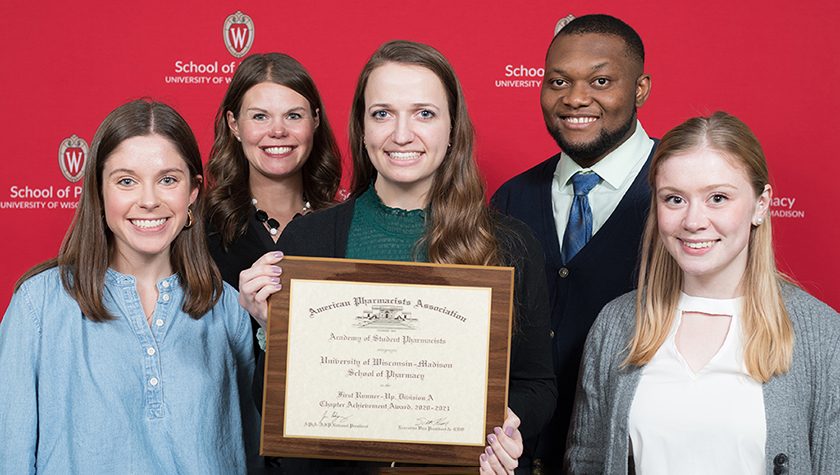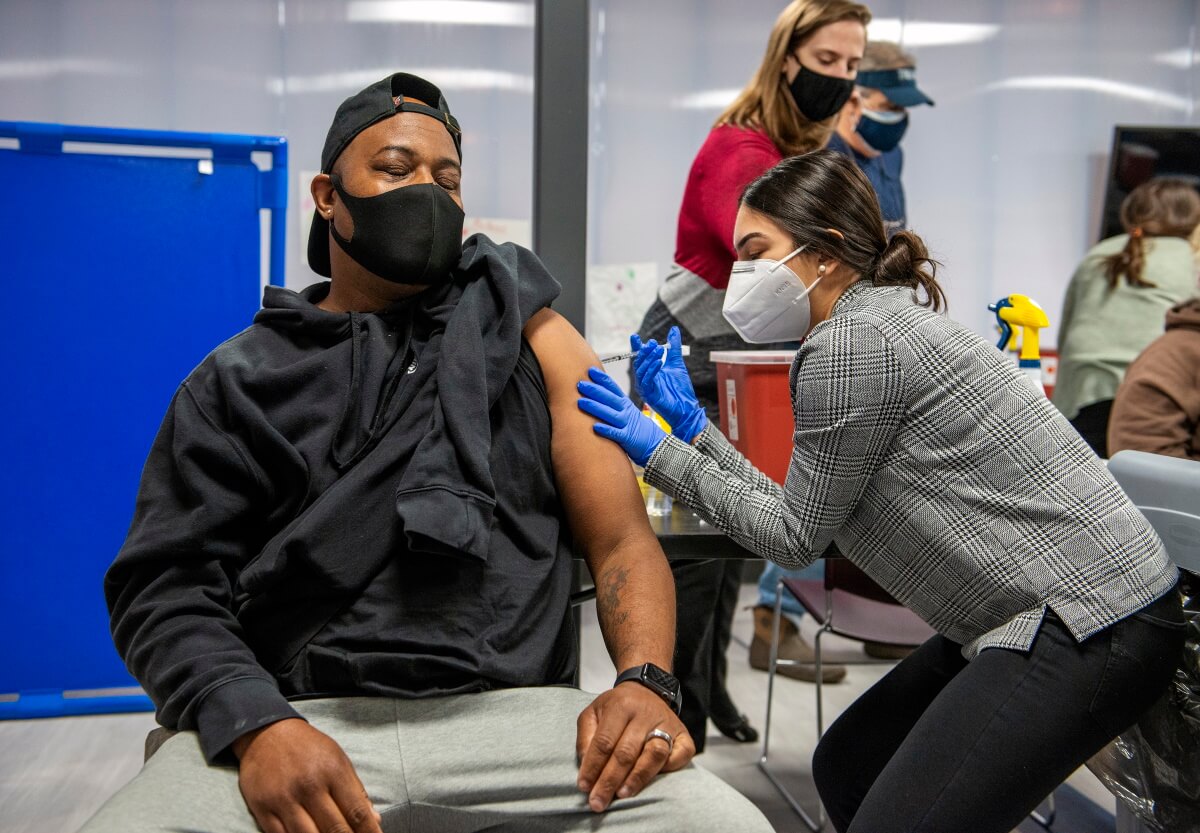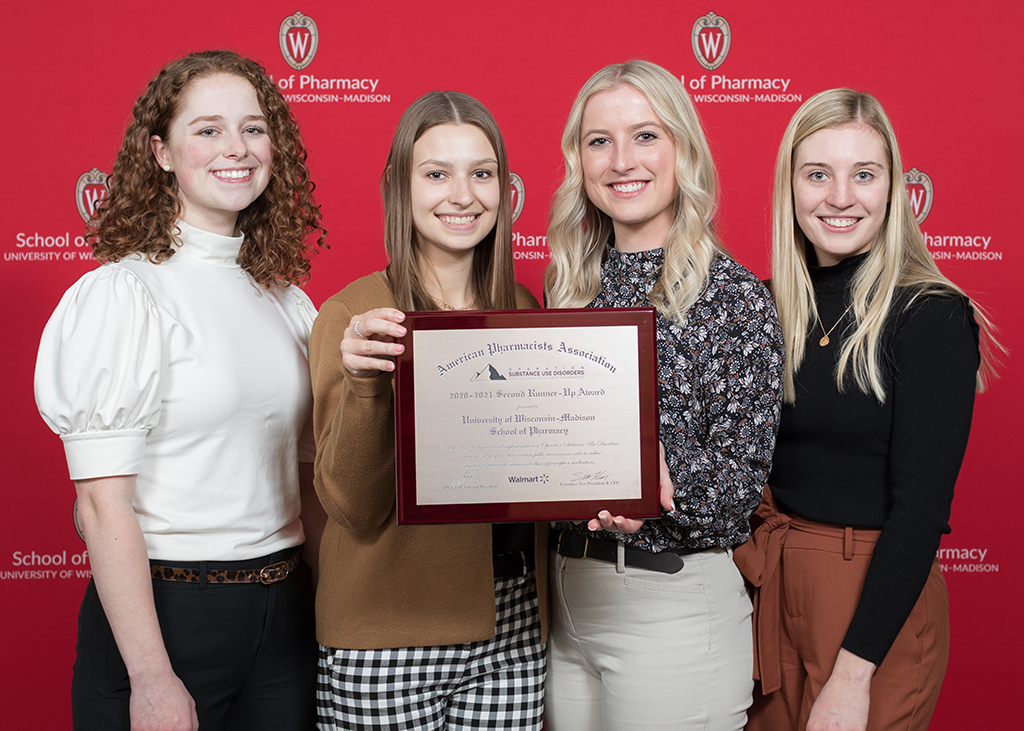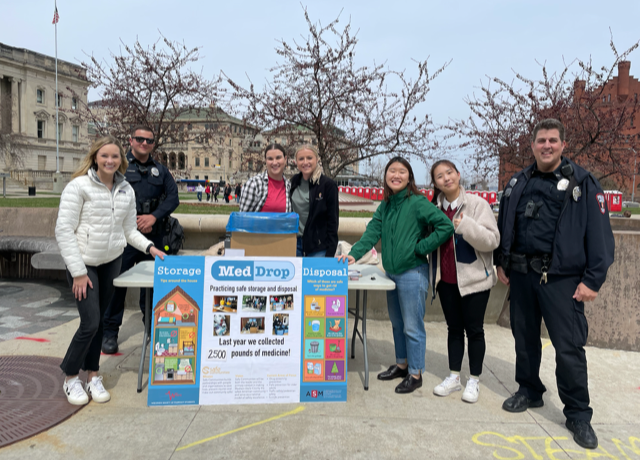
Recognition from the American Pharmacists Association and American Society of Health-System Pharmacists illustrates PharmD student leadership, outreach, and impact
By Katie Ginder-Vogel
“Advocating for the health and safety of patients is an integral role for a pharmacist,” says University of Wisconsin–Madison School of Pharmacy PharmD student Chelsea Moyer. As the co-chair of Operation MedDrop, organized by the Wisconsin Society of Pharmacy Students (WSPS), Moyer helps to run events to collect expired and unused medications and educate patients around the Madison area.
“Through education and promoting events I have begun to find my voice on how to create change and impact the health of patients,” she says. “These experiences will stay with me as I practice pharmacy in the future and encourage me to continue to find ways to enhance patient care.”
This dedication to community outreach and education is why Moyer and her PharmD student peers in WSPS have earned three national awards in 2022: the Outstanding Professional Development Project award from the American Society of Health-System Pharmacists (ASHP) and the First Runner-Up for the Best National Chapter (Division A) and Second Runner-Up for Operation Substance Use Disorder from the American Pharmacists Association’s Academy of Student Pharmacists (APhA-ASP).
“Through education and promoting events I have begun to find my voice on how to create change and impact the health of patients.”
—Chelsea Moyer
These honors come on the heels of two more recognitions from APhA-ASP: For the 2020–21 academic year, WSPS earned Region 4 awards for their Operation Immunization and Operation Heart outreach initiatives.
“Pharmacists are inherent leaders,” says PharmD student Johanna Van Epps, Operation Substance Use Disorder (SUD) co-chair. “This experience afforded me the opportunity to practice leadership as an action-oriented behavior and collaborate with others to implement positive change, both of which will be important in my career as a pharmacist.”
APhA-ASP Best Chapter Runner-Up
Out of 142 APhA-ASP chapters nationwide, the School’s WSPS came in second in Division A.
“Our chapter is extremely involved in many different areas, including patient care, advocacy, and professional development,” says PharmD student Taylor Shufelt, WSPS secretary. “The wide array of events WSPS hosts and how successful these events are sets our chapter apart from others.”

Over the 2020–21 academic year, WSPS hosted 97 events and presentations that attracted nearly 8,000 patients and led to 1,400 patients receiving health screenings and 3,350 patients receiving clinical services. And that’s without mentioning their participation in vaccinating more than 10,000 Wisconsinites against COVID-19.
“We feel honored to receive such a prestigious national recognition for our collective work,” says Michael Nome, WSPS president-elect. “It feels like the icing on the cake of the fulfillment that comes when we give back to the community, care for our patients, and advocate for the advancement of our pharmacy profession.”
Shufelt, Nome, and WSPS president PharmD student Rachel Hawley say they have refined their collaboration and leadership skills as part of the executive board overseeing an organization of over 200 student pharmacist members and 40 board members.
“This experience has also helped us create a professional identity and has equipped us with communication skills,” says Nome.
APhA-ASP Operation Substance Use Disorder Second Runner-Up
WSPS’s Operation Substance Use Disorder (SUD) goes into the community to raise awareness about prescription drug misuse and abuse at community health fairs and in high schools. Last year, their events were largely focused on education about naloxone — an opioid antagonist used to treat overdoses — for both student pharmacists and community members at a local shelter.
“We are grateful that we were able to empower members of the community with the information to take action in the case of an emergency overdose situation and help reduce some stigma around naloxone use,” says PharmD student Sarah Fierek, SUD co-chair.

Nationally, WSPS was the second runner-up for a patient care award in the Operation Substance Use Disorder (SUD) category, which includes WSPS’ Operation MedDrop.
“We were very excited that our work was recognized,” says Fierek.
In 2021, the group hosted the first annual Naloxone Training Virtual Event for UW–Madison pre-pharmacy and pharmacy students, where WSPS members discussed naloxone’s mechanism of action, indication for use, and patient counseling, and demonstrated appropriate use of naloxone training devices. Psychiatric pharmacy residents from the William S. Middleton Memorial Veterans Hospital also shared their experiences with naloxone patient education in practice. Almost 40 students attended.
“Our goal was to deepen the dialogue surrounding naloxone use in a setting outside of traditional didactic coursework and empower student pharmacists to be agents of positive change in their future practice,” says PharmD student Johanna Van Epps, SUD co-chair. “Community outreach in a virtual setting is challenging, but the Naloxone Training Virtual Event demonstrated how innovation can help overcome adversity and still lead to positive change.”
By educating more community members about the use of naloxone, the student pharmacists are working to reduce the number of opioid-related deaths.

“By discussing non-stigmatizing ways for student pharmacists to talk to patients about naloxone use, we were able to influence a new generation of healthcare providers to feel comfortable talking to their patients about this difficult topic,” says Fierek.
Because MedDrop, too, couldn’t hold its usual events during COVID-19 shut-downs, the co-chairs asked local police stations and Safe Communities to sponsor their events, so they could continue collecting medications from community members. They partnered with UW Madison Campus Police to hold a take-back event on campus, which allowed community members and students with limited transportation options to utilize the service.
“We collected thousands of pounds of unused, unwanted, and/or expired medications from community members throughout the year,” says Moyer, which helps prevent accidental poisonings, misuse, environmental contamination, and other issues. “Knowing that we have made people’s homes, the environment, and the community as a whole a safer place feels incredible.”
“As pharmacists, we can do so much more than impact a single patient’s life at any one given instance; we have the ability to educate, impact, and empower entire communities at a time,” says PharmD student Chrystelle Schowalter, MedDrop co-chair.
ASHP Outstanding Professional Development Project Award
Every year, the Pharmacy Society of Wisconsin (PSW) brings pharmacists from around the state together to discuss current legislative issues in pharmacy and visit the Wisconsin State Capitol to speak with legislators. In 2021, due to the COVID-19 pandemic, instead of holding the typical PSW Legislative Day, the organization transitioned to a month of virtual advocacy.
A social media campaign to accompany the PSW Legislative Month of Advocacy, conceptualized and executed by PharmD students in WSPS, earned a 2021–22 Outstanding Professional Development Award from the ASHP Pharmacy Student Forum.
“I was really excited to learn we received this recognition,” says PharmD student Brianna Groen, WSPS secretary. “Everyone contributed to make it successful.”
Their winning campaign, shared on Facebook and Instagram, also came about as a result of the pandemic and evolving laws to empower student pharmacists to help deliver COVID-19 vaccinations.
As PharmD student Taylor Shufelt, WSPS public relations chair, was trying to come up with a WSPS contribution to the PSW Legislative Month of Advocacy, the timing aligned with Wisconsin Act 3, legislation that allowed pharmacy students of any age to vaccinate people against COVID-19. Shufelt had seen negative comments on social media from people uncomfortable with the idea of being vaccinated by a pharmacy student, despite their extensive training — the same training that all Wisconsin pharmacists receive to give immunizations.
“When immunizing was so important, and pharmacists couldn’t keep up with the workload, I wondered, how can I use the platform we have to dispel myths about this new legislation and share student pharmacists’ perspectives?” says Shufelt.
With the enthusiasm of Groen and WSPS policy chairs Jessica Fuhrman and Dan Funk, both PharmD students, Shufelt and her fellow officers created three social media posts explaining the legislation, the training pharmacy students and pharmacists receive, and perspectives from student pharmacists who were helping vaccinate their community members.
“I wanted to provide baseline knowledge of how PSW is involved in advocacy,” says Shufelt. “One slide was about how you can participate in advocacy and provided an overview of recent laws that had been implemented, broken down into friendly language. We got the voices of five student pharmacists who are immunizers about why they volunteered and feel confident.”
Shufelt, who has moved into the WSPS secretary position, says she has enjoyed the communications work involved in both roles.
“I could see myself intertwining it into a pharmacy role, because I’m interested in public health and advocacy,” she says. “I could use my voice and platform to get a message to a greater number of people.”
Groen is no stranger to pharmacy advocacy, having created the “Talk to Your Pharmacist Tuesday” series that runs each American Pharmacists Month, observed in October, which she says helped her find her own voice as a pharmacy advocate.
“I plan to continue to incorporate pharmacy advocacy into my daily practice, helping patients get the most out of their meds, and on a larger scale, working to get new legislation passed,” Groen says. “Pharmacy school has given me a great base.”
Learn about more recent awards the School’s Wisconsin Society of Pharmacy Students earned for Operation Heart and Operation Immunization.